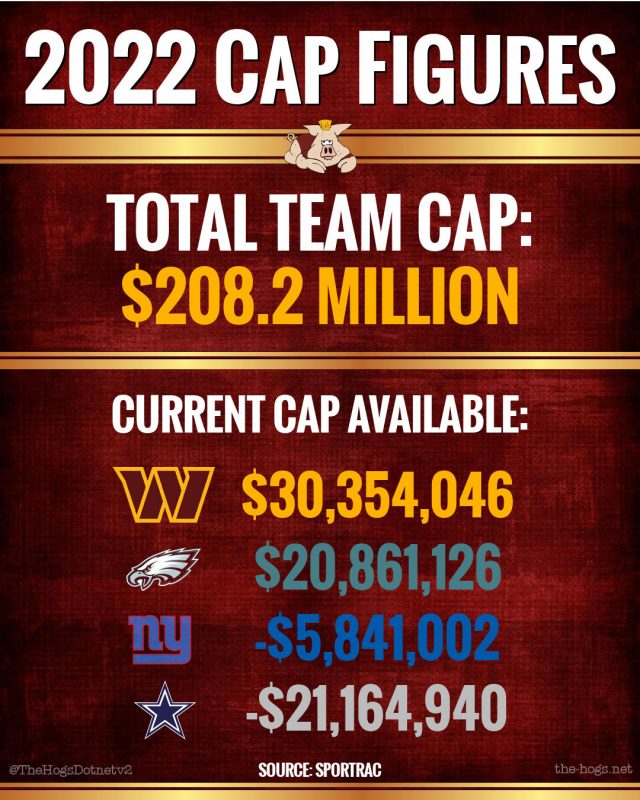How much money will Washington have to spend in their first season as the Commanders? According to yesterday’s reports, the 2022 NFL Salary Cap number will be set at $208.2 million. With the new league year starting next week, teams have just over a week to get in line with the cap.
The 2022 number is up more than $25 million over last year’s $182.5 million. That sends a slightly misguided message though, as the cap was dropped last season for Covid “losses”. It was the first time in its history, that the cap number had dropped. In 2020, the cap was $198 million, so the 2022 number is a gain of approximately $10 million over that.
That’s a decent increase that some teams will be desperately happy to see.
Commanders Cap
Depending on which online resource you check, the Commanders are sitting between $178 million and $182 million in cap money already allocated. That leaves them with somewhere in the neighbourhood of $30 million to spend without doing any contract re-structuring of existing players.
That puts Washington near the top ten in the NFL, in terms of how much money they have to spend.
It may seem like a good chunk of change, but given that Washington is desperately seeking a franchise quarterback, they might need it.
For comparison’s sake, the Miami Dolphins lead the league with approximately $61 million to spend. The Saints have to dump over $40 million by next week to get under the total cap number.
Also of interest, is that the Dallas Cowboys are currently more than $21 million over next year’s cap. While they can re-structure contracts like Dak Prescott’s, they will also lose an asset or two, like wide receiver Amari Cooper.
According to Sportrac, here are the 2022 Team Cap Numbers:
| Team | Cap Space |
| Miami Dolphins | $61,232,642 |
| Los Angeles Chargers | $57,530,555 |
| Jacksonville Jaguars | $56,096,704 |
| Cincinnati Bengals | $48,778,062 |
| New York Jets | $44,728,732 |
| Denver Broncos | $39,188,529 |
| Indianapolis Colts | $36,986,936 |
| Seattle Seahawks | $35,399,263 |
| Carolina Panthers | $31,307,899 |
| Washington Commanders | $30,354,046 |
| Pittsburgh Steelers | $29,598,950 |
| Chicago Bears | $25,689,286 |
| Tampa Bay Buccaneers | $21,310,880 |
| Philadelphia Eagles | $20,861,126 |
| Las Vegas Raiders | $20,646,588 |
| Detroit Lions | $20,132,913 |
| Cleveland Browns | $18,574,425 |
| Houston Texans | $16,850,873 |
| New England Patriots | $11,503,099 |
| Baltimore Ravens | $9,792,591 |
| San Franciso 49ers | $2,952,032 |
| Arizona Cardinals | $2,744,575 |
| Buffalo Bills | $-3,914,149 |
| Kansas City Chiefs | $-4,296,851 |
| New York Giants | $-5,841,002 |
| Atlanta Falcons | $-6,590,266 |
| Tennessee Titans | $-6,905,413 |
| Los Angeles Rams | $-13,172,364 |
| Minnesota Vikings | $-14,725,024 |
| Dallas Cowboys | $-21,164,940 |
| Green Bay Packers | $-29,795,758 |
| New Orleans Saints | $-42,349,119 |
Franchise And Transition Tags
The new cap number creates some pretty lofty franchise and transition tag numbers as well.
It will now cost an NFL team almost $30 million to franchise tag a quarterback ($29,703,000). An offensive lineman will cost about $16,662,000. That doesn’t apply to Brandon Scherff as he has already been tagged twice. It seems increasingly likely that the perennial Pro Bowler will not be returning.
A wide receiver will cost $18,419,000. A linebacker even more than that, at $18,702,000.
Perhaps the most surprising trend, is that running backs have dipped to under $10 million ($9,570,000). Only kickers and punters garner less ($5,220,000).
Franchise tags guarantee a team compensation if another team signs the player, transition tags do not. As such, transition tags use the average of the top ten players at the position as opposed to the top five that franchise tags use.

